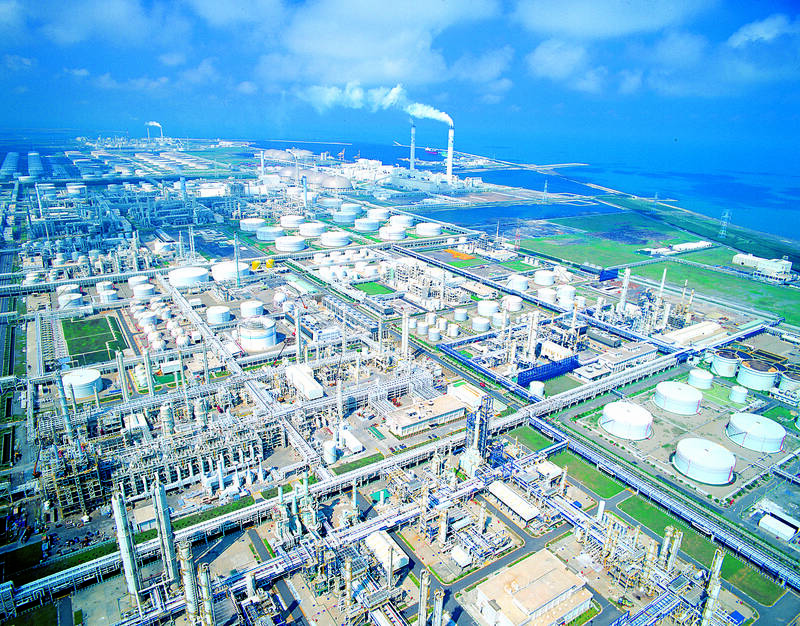Formosa Plastics Group (台塑集團), Taiwan’s largest industrial conglomerate, yesterday posted a small profit for its major four units of NT$715 million (US$21.69 million) for the fourth quarter and NT$8.37 billion for last year, it said, blaming languid demand and China’s overproduction.
The fourth-quarter results represented a comeback from losses of NT$8.03 billion in the preceding quarter, but suggested an 81 percent plunge, or earnings of NT$0.29 per share, compared with a year earlier, company data showed.
The poor earnings came even though combined revenues last year slipped only 2.1 percent to NT$1.47 trillion amid lingering excessive supply induced by Chinese peers, the group said.

Photo: Chang Huei-wen, Taipei Times
Consequently, the group said it would issue moderate year-end bonuses equivalent to three months of wages for its employees later this month.
The conglomerate said it is looking at business improvement this year for petrochemical products, but voiced concern that US president-elect Donald Trump’s planned tariff hikes would slow the pace of recovery.
Formosa Petrochemical Corp (台塑石化), engaged primarily in the business of refining crude oil, selling refined petroleum products and producing and selling olefins from its naphtha-cracking operations, last quarter emerged from losses by posting a profit of NT$1.27 billion, helped by inventory recovery, indirect investment and foreign exchange benefits, the company said in a stock exchange filing.
Similar reasons enabled the unit to book NT$5.944 billion of net income for the whole of last year, or earnings of NT$0.62 per share, it said.
Nan Ya Plastics Corp (南亞塑膠), whose main business involves producing processed plastic and chemical products, electronic materials and polyester fiber, last quarter saw its profit surge more than threefold to NT$280 million, as demand for most products picked up, it said.
Further, the company indirectly benefited from materials used in the development of artificial intelligence, it said.
For the whole of last year, Nan Ya reported a net income of NT$3.32 billion, or earnings of NT$0.42 per share, as the negative impact of global inflation and monetary tightening lessened, giving its customers renewed interest in rebuilding their inventories, it said.
However, the figures indicated a 47.4 percent retreat from a year earlier.
Formosa Chemicals and Fibre Corp (台灣化學纖維), which produces and sells petrochemical products, nylon fibers and rayon staple fibers in Taiwan and abroad, booked losses of NT$1.07 billion for the fourth quarter of last year, dragged by the falling international oil price and a supply glut, it said.
The subsidiary managed a tiny profit of NT$379 million for last year, or earnings of NT$0.06 per share, it said.
The company said it would seek to diversify its markets beyond China and focus on products that generate higher margins.
Formosa Plastics Corp (台灣塑膠), a vertically integrated supplier of plastic resins and petrochemicals, climbed out of the woods in the foruth quarter with a net income of NT$234 million, but swung to a loss of NT$1.27 billion, or NT$0.2 per share, last year, its filing said.
Core businesses continued to take losses and an investment in Fxuin Special Steel Co (福欣特殊鋼), a Chinese company based in China’s Fujian Province, also proved ill-fated, muting an increase in overall sales, it said.

In Italy’s storied gold-making hubs, jewelers are reworking their designs to trim gold content as they race to blunt the effect of record prices and appeal to shoppers watching their budgets. Gold prices hit a record high on Thursday, surging near US$5,600 an ounce, more than double a year ago as geopolitical concerns and jitters over trade pushed investors toward the safe-haven asset. The rally is putting undue pressure on small artisans as they face mounting demands from customers, including international brands, to produce cheaper items, from signature pieces to wedding rings, according to interviews with four independent jewelers in Italy’s main

Japanese Prime Minister Sanae Takaichi has talked up the benefits of a weaker yen in a campaign speech, adopting a tone at odds with her finance ministry, which has refused to rule out any options to counter excessive foreign exchange volatility. Takaichi later softened her stance, saying she did not have a preference for the yen’s direction. “People say the weak yen is bad right now, but for export industries, it’s a major opportunity,” Takaichi said on Saturday at a rally for Liberal Democratic Party candidate Daishiro Yamagiwa in Kanagawa Prefecture ahead of a snap election on Sunday. “Whether it’s selling food or

CONCERNS: Tech companies investing in AI businesses that purchase their products have raised questions among investors that they are artificially propping up demand Nvidia Corp chief executive officer Jensen Huang (黃仁勳) on Saturday said that the company would be participating in OpenAI’s latest funding round, describing it as potentially “the largest investment we’ve ever made.” “We will invest a great deal of money,” Huang told reporters while visiting Taipei. “I believe in OpenAI. The work that they do is incredible. They’re one of the most consequential companies of our time.” Huang did not say exactly how much Nvidia might contribute, but described the investment as “huge.” “Let Sam announce how much he’s going to raise — it’s for him to decide,” Huang said, referring to OpenAI

The global server market is expected to grow 12.8 percent annually this year, with artificial intelligence (AI) servers projected to account for 16.5 percent, driven by continued investment in AI infrastructure by major cloud service providers (CSPs), market researcher TrendForce Corp (集邦科技) said yesterday. Global AI server shipments this year are expected to increase 28 percent year-on-year to more than 2.7 million units, driven by sustained demand from CSPs and government sovereign cloud projects, TrendForce analyst Frank Kung (龔明德) told the Taipei Times. Demand for GPU-based AI servers, including Nvidia Corp’s GB and Vera Rubin rack systems, is expected to remain high,